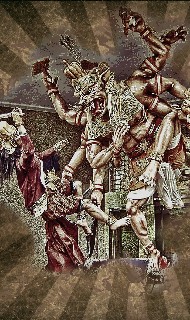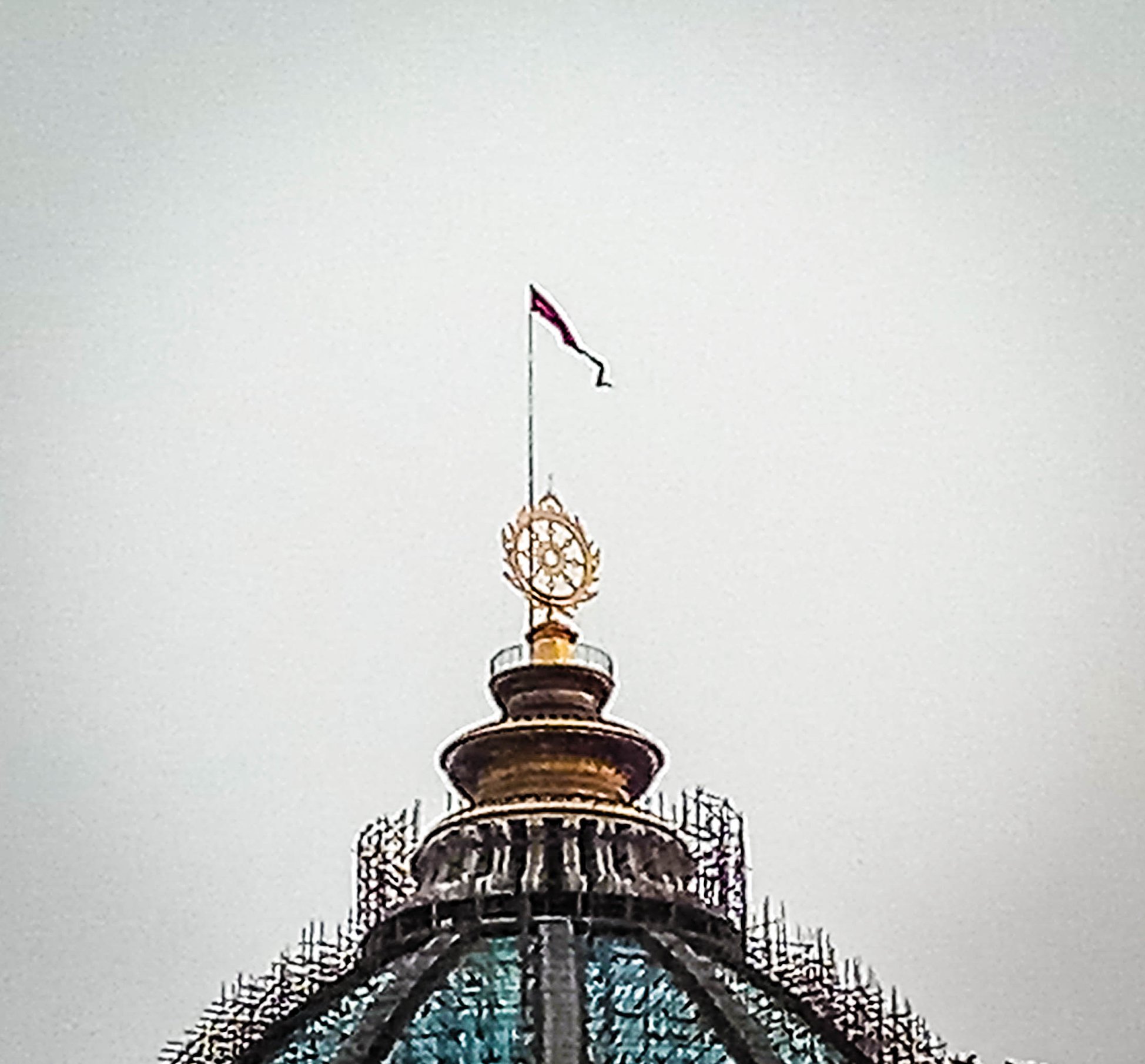Introduction to Mayapura kirtana
Harinama at Burleigh Heads – 22 April 2018 (Album of photos)…
→ Dandavats

Harinama at Burleigh Heads - 22 April 2018 (Album of photos) Srila Bhaktisiddhanta Sarasvati Thakura: Krsna as the source of love ...
Mohini Ekadasi Kirtan at Iskcon Nepal (Album of photos)
Srila…
→ Dandavats

Mohini Ekadasi Kirtan at Iskcon Nepal (Album of photos)
Srila Prabhupada: Caitanya Mahaprabhu is very practical, that “I want to give krsna-prema. One should be ecstatic, emotional in krsna-prema. One shall cry for Krsna.” And He taught everyone by His practical example how He was mad after Krsna. Govinda-virahena me. Sunyayitam jagat sarvam govinda-virahena me. This is krsna-prema: without Krsna, one should see everything vacant. This is Radharani’s prema. But that is not possible for ordinary human being. It might be possible for Caitanya Mahaprabhu and few devotees. >>> Ref. VedaBase => Srimad-Bhagavatam 3.25.30 – Bombay, November 30, 1974
Find them here: https://goo.gl/TqDmHX
Giriraj Swami: Today is Rukmini-dvadasi, the appearance day of…
→ Dandavats

Giriraj Swami: Today is Rukmini-dvadasi, the appearance day of Srimati Rukmini-devi.
“The beloved consorts of Lord Krishna are of three kinds: the goddesses of fortune, the queens, and the milkmaids of Vraja, who are the foremost of all. These consorts all proceed from Radhika.” (Cc Adi 4.74–75) Of all Krishna’s queens in Dvaraka, Rukmini-devi is the principal. Ultimately, she is an expansion of Srimati Radharani.
Many of Rukmini and Krishna’s pastimes are described in Srimad-Bhagavatam, and they are relishable and instructive. When I first read the story of Rukmini and Krishna in the Krsna book, I thought that it was the most wonderful story—one that could make a fabulous movie, with romance, suspense, chivalry, adventure, and a truly happy ending. I thought, “This is amazing. You get everything in Krishna consciousness—but completely pure and spiritual.”
If we worship Rukmini-Dvarakadisa and make them the center of our lives, we may enjoy some of their opulence. But material opulence is incidental, because material things without Krishna will not make us happy. The real thing is Krishna. Only Krishna can make us happy, and with Krishna we will be happy—with or without material things.
Rukmini-dvadasi is super-excellent because it is meant to infuse us with thoughts of Krishna, inspire our attraction for Krishna. That is why Srila Prabhupada wrote books, established temples, installed Deities, and trained devotees, so that they could always be busy with Krishna, busy for Krishna, and by association inspire and teach others also how to be absorbed in Krishna. Among the main processes in the present age of Kali, the foremost is the chanting of the holy names: Hare Krishna, Hare Krishna, Krishna Krishna, Hare Hare/ Hare Rama, Hare Rama, Rama Rama, Hare Hare. So let us chant Hare Krishna, dance, feast on krsna-prasada, and be happy in Krishna consciousness.
Has neuroscience shown that there is no inner seer?
→ The Spiritual Scientist
Answer Podcast
The post Has neuroscience shown that there is no inner seer? appeared first on The Spiritual Scientist.
How does Hanuman embody humble ambitiousness? (Ramayana)
→ The Spiritual Scientist
Answer Podcast
The post How does Hanuman embody humble ambitiousness? (Ramayana) appeared first on The Spiritual Scientist.
How do we treat devotees when they leave Krishna consciousness?
→ Successful Vaisnavas – Personal Development for Hare Krishnas
Soon after posting an interview with a devotee (recorded a year earlier)I received an email informing me that the devotee I had interviewed had left Krishna consciousness. To verify this I checked out his Facebook Page and I was sad to see this post… I was even more sad to see this post… even a […]
The post How do we treat devotees when they leave Krishna consciousness? appeared first on Successful Vaisnavas - Personal Development for Hare Krishnas.
How do we treat devotees when they leave Krishna consciousness?
→ Successful Vaisnavas – Personal Development for Hare Krishnas
Soon after posting an interview with a devotee (recorded a year earlier)I received an email informing me that the devotee I had interviewed had left Krishna consciousness. To verify this I checked out his Facebook Page and I was sad to see this post… I was even more sad to see this post… even a […]
The post How do we treat devotees when they leave Krishna consciousness? appeared first on Successful Vaisnavas - Personal Development for Hare Krishnas.
How the mind becomes unclear and how to clear it
→ The Spiritual Scientist
[Talk at University of Colorado, Boulder, USA]
Podcast
Podcast Summary
Video:
The post How the mind becomes unclear and how to clear it appeared first on The Spiritual Scientist.
God as the supreme therapist 5 – Cultivating qualities is integral to cultivating devotion
→ The Spiritual Scientist
[Narasimha Chaturdashi series on Prahlada’s prayers to Narasimhadeva 5.8.8-14]
[Bhagavatam class on 5.8.12 at ISKCON, Denver, USA ]
Podcast
Podcast Summary
Video:
The post God as the supreme therapist 5 – Cultivating qualities is integral to cultivating devotion appeared first on The Spiritual Scientist.
Sri Rukmini-dvadasi, the Appearance Day of Srimati Rukmini-devi
Giriraj Swami
 Today is Rukmini-dvadasi, the appearance day of Srimati Rukmini-devi. There have been wonderful festivities all day, beginning with the special darshan of the Deities in Their flower outfits, and just now a wonderful abhiseka. During the abhiseka I really felt like I was in Vrindavan. There was so much devotion, spontaneous devotion—every time the pujaris poured another substance on the Deities, there would be gasps and cries of ecstasy and approval. It was really wonderful. And that is life in Krishna consciousness—somehow being captivated by Krishna, the beauty of Krishna, manifest in His deity forms, His holy names, and His words and descriptions, the revealed scriptures. We want, somehow or other, to be absorbed in Krishna, and that absorption, encouraged by all these different activities, will cleanse the heart naturally and make us happy.
Today is Rukmini-dvadasi, the appearance day of Srimati Rukmini-devi. There have been wonderful festivities all day, beginning with the special darshan of the Deities in Their flower outfits, and just now a wonderful abhiseka. During the abhiseka I really felt like I was in Vrindavan. There was so much devotion, spontaneous devotion—every time the pujaris poured another substance on the Deities, there would be gasps and cries of ecstasy and approval. It was really wonderful. And that is life in Krishna consciousness—somehow being captivated by Krishna, the beauty of Krishna, manifest in His deity forms, His holy names, and His words and descriptions, the revealed scriptures. We want, somehow or other, to be absorbed in Krishna, and that absorption, encouraged by all these different activities, will cleanse the heart naturally and make us happy.
In terms of tattva (ontology), Krishna is the Absolute Truth. From Him everything emanates. He is the cause of all causes.
isvarah paramah krsnah
sac-cid-ananda-vigrahah
anadir adir govindah
sarva-karana-karanam
“Krishna, who is known as Govinda, is the Supreme Godhead. He has an eternal, blissful, spiritual body. He is the origin of all. He has no other origin, and He is the prime cause of all causes.” (Bs 5.1)
Once, on a morning walk here at Cheviot Hills Park, I asked Srila Prabhupada, “We say that Krishna is the origin of all, but sometimes people question us, ‘You say Krishna is the origin, but what is Krishna’s origin?’ What should we answer?” And Prabhupada replied, “You should tell them that according to our information, Krishna is the origin of everything and has no origin, but if you find someone or something that is the origin of Krishna, we will worship that person or thing—but until then you should worship Krishna.”
So, Krishna is the origin, but in terms of tattva, there are two basic categories: vishnu-tattva and shakti-tattva. Krishna is the source of all Vishnu forms, beginning with Balarama (Krishna’s first expansion), Vasudeva, Sankarsana, Pradyumna, and Aniruddha—so many expansions on the side of the energetic (Vishnu). Similarly, there are so many expansions on the side of the energy (shakti), and the first is Srimati Radharani. From Her expand so many gopis in Vrindavan, so many queens in Dvaraka, and so many Laksmis in Vaikuntha.
krsna-kanta-gana dekhi tri-vidha prakara
eka laksmi-gana, pure mahisi-gana ara
vrajangana-rupa, ara kanta-gana-sara
sri-radhika haite kanta-ganera vistara
“The beloved consorts of Lord Krsna are of three kinds: the goddesses of fortune, the queens, and the milkmaids of Vraja, who are the foremost of all. These consorts all proceed from Radhika.” (Cc Adi 4.74–75)
Of all Krishna’s queens in Dvaraka, Rukmini-devi is the principal. Ultimately, she is an expansion of Srimati Radharani. All of Rukmini’s qualities are present in Radharani, though Radharani manifests some qualities that Rukmini doesn’t.
Many of Rukmini and Krishna’s pastimes are described in Srimad-Bhagavatam, and they are relishable and instructive. When I first read the story of Rukmini and Krishna in the Krsna book, I thought that it was the most wonderful story—one that could make a fabulous movie, with romance, suspense, chivalry, adventure, and a truly happy ending. I thought, “This is amazing. You get everything in Krishna consciousness—but completely pure and spiritual.”
Rukmini was the daughter of the king of Vidarbha, and when sages and saintly persons visited the royal palace, they would glorify the transcendental beauty, prowess, and character of Krishna. Sages knew Krishna to be the Supreme Personality of Godhead, and so they were pleased to glorify Him. And because He was acting as a ruler, kshatriyas were also pleased to speak about Him. By hearing about Krishna, Princess Rukmini became attached to Him (we could say she fell in love with Him). She had never met Him, but just by hearing about Him she developed great faith, attraction, and love for Him and decided that He would be the perfect husband for her.
This is instructive for all of us, that if we hear about Krishna without envy, we will also become attracted to Him. Of course, Rukmini was a very pious, religious, pure-hearted girl. In fact, she was an expansion of Srimati Radharani. But because she was pure and religious and cultured, hearing about Krishna had an especially powerful effect on her heart. In the same way, if we lead pure lives as ordained by scripture, as taught by Srila Prabhupada, when we hear about the beauty and qualities and pastimes of Krishna, we will also become attracted.
Thus Rukmini, a most qualified princess, became attached to Krishna, the most qualified prince, and decided to marry Him. But her eldest brother, Rukmi, was envious of Krishna and forbade her marriage with Him. Instead, he arranged her marriage with his friend Sisupala, who was practically from birth envious of and antagonistic toward Krishna.
Other than Rukmi, all Rukmini’s family members and well-wishers, including her father, favored her match with Krishna. And Rukmini, Krishna’s eternal consort, could not think of marrying anyone else. Later, she told Krishna that only a woman who had not relished the fragrance of the honey of His lotus feet could accept someone else as her husband or lover. Any other suitor would be a “living corpse”—a bag covered with skin, whiskers, nails, and hair and filled with flesh, bones, blood, stool, mucus, bile, and air. “What woman,” she averred, “who has once heard Your glories from saintly persons and relished the nectarean fragrance of Your lotus feet would take shelter of some mortal who is always afraid of death?” She insisted that she would depend only on Krishna, who has an eternal, blissful, spiritual form.
Understanding the entire situation, Rukmini, in a bold move, sent a message to Krishna through a trustworthy brahman, expressing her heart’s desire to have only Him as her husband and suggesting how He could steal her away from the assembly at her proposed marriage the following day.
Rukmini was so beautiful and attractive that not only Sisupala but many kings and princes desired her. That is what we experience in the material world: Pretty much everyone looks at us as objects to exploit and enjoy, however sweetly they may act or speak. For example, at the end of almost any phone call to a large business, the company’s rep will ask, “Is there anything else I can do for you?” It’s all scripted. The ultimate purpose is to get your money, but they ask ever so politely, “Is there anything else I can do for you today?” Underneath it all, people want to get something from you for themselves. They want to exploit your body, your mind, or your resources. They are just like the lusty kings and princes hovering around Rukmini.
In that delicate predicament, that awkward situation, Rukmini reached out to Krishna, cried out to Him to save her. That was the only recourse she had, and ultimately that is the only recourse any of us has. We are in an ocean surrounded by sharks ready to devour us, and the only one who can save us is Krishna.
daivi hy esa guna-mayi
mama maya duratyaya
mam eva ye prapadyante
mayam etam taranti te
[Lord Krishna says,] “This divine energy of Mine, consisting of the three modes of material nature, is difficult to overcome. But those who surrender unto Me can easily cross beyond it.” (Gita 7.14)
Rukmini surrendered herself to Lord Krishna with utter, complete sincerity, and the Lord reciprocated and delivered her. Sometimes we also pray to Krishna, but with some duplicity. We want Krishna’s help but at the same time still desire to enjoy materially, without Krishna. There is a saying about soldiers in combat: “There are no atheists in foxholes.” Foxholes are pits dug for cover from enemy fire. There are no atheists in foxholes because someone in extreme danger will naturally pray to God, knowing intuitively that only God can save him. But after he has been saved from his immediate danger, the person will tend to forget God and again think, “I’m the controller, I’m the enjoyer, I’m the proprietor,” and return to his ordinary, self-centered, inauspicious way of life.
Princess Rukmini was completely sincere. She wanted only to serve Krishna, and nothing else. Nothing else would satisfy her. And so she concluded her message to Krishna:
yasyanghri-pankaja-rajah-snapanam mahanto
vanchanty uma-patir ivatma-tamo-’pahatyai
yarhy ambujaksa na labheya bhavat-prasadam
jahyam asun vrata-krsan chata-janmabhih syat
“O lotus-eyed one, great souls like Lord Siva hanker to bathe in the dust of Your lotus feet and thereby destroy their ignorance. If I cannot obtain Your mercy, I shall simply give up my vital force, which will have become weak from the severe penances I will perform. Then, after hundreds of lifetimes of endeavor, I may obtain Your mercy.” (SB 10.52.43)
Now, one could argue that yes, she wanted Krishna, but along with Krishna she got a beautiful palace—there are descriptions in the Bhagavatam of the extraordinary opulence of Dvaraka—and so many nice children and servants and maidservants, and so much affluence. Actually, there is no harm in opulence as long as Krishna is in the center. The main thing is that Krishna should be in the center. A chaste and faithful wife—this is another instruction from the narration of Rukmini and Krishna in the Bhagavatam—will follow her husband. If he is in an opulent position, so be it; or if by circumstances he falls into a poor condition, still she will stay with him. And sometimes it happens that the poor husband, by the grace of Krishna, becomes opulent.
One example is Sudama Vipra. He was Krishna’s friend from when they were students in the gurukula, in the ashram, of Sandipani Muni. Sudama was a peaceful and learned brahman, detached from sense enjoyment, and he ended up being very poor. Krishna was a prince, the husband of the goddess of fortune, and He naturally ended up being supremely opulent. One day, Sudama’s wife, weak from hunger and distressed (more for her husband’s sake than for her own), implored him, “The Supreme Lord Krishna is nearby in Dvaraka. He is a personal friend and is compassionate to brahmans. Please approach Him, and He will surely give you, a suffering householder, abundant wealth.”
Sudama was not very keen on asking for something material from Krishna, but he did like the idea of seeing Him. In accordance with proper etiquette, he wanted to bring some gift, and he asked his wife if there was anything in the house he could take. They had nothing, so she begged four handfuls of flat rice from neighboring brahmans, tied it in a torn piece of cloth, and gave it to her husband as a present for Lord Krishna. Thus Sudama set out to Dvaraka, constantly thinking of Krishna.
When Lord Krishna caught sight of the brahman, He immediately stood up, went forward to meet him, and embraced him with great pleasure. He seated him very nicely on His own bedstead and washed his feet, while Queen Rukmini, the divine goddess of fortune herself, personally fanned the poor brahman. After some affectionate, philosophical talks about their times in service to their guru, Krishna asked His friend, “What gift have you brought Me?” Sudama felt so ashamed and embarrassed, he simply remained silent and bowed his head. Then the Lord, who knew everything, snatched the grains of chipped rice tied in the old cloth and exclaimed, “What is this?” He ate a palmful of the rice, but when he was about to eat a second, Queen Rukmini caught hold of His hand and said, “One palmful is enough.” According to Visvanatha Cakravarti, she was thinking, “If you eat all of this wonderful treat Yourself, what will be left for my friends and servants and me?”
Rukmini told Krishna, “This is more than enough to satisfy You. Your pleasure alone assures Your devotee of opulence in this life and the next.” In Krsna (Ch. 81), Srila Prabhupada comments, “This indicates that when food is offered to Lord Krsna with love and devotion and He is pleased and accepts it from the devotee, Rukmini-devi, the goddess of fortune, becomes so greatly obliged to the devotee that she has to go personally to the devotee’s home to turn it into the most opulent home in the world.”
Sudama spent the night in Lord Krishna’s palace, and the next day, after being duly honored by the Lord, without having asked Him for any material benefit, he set off for his home. Walking along the road, he felt blissful, satisfied just by the Lord’s darshan. And he thought that the merciful Lord, considering that if he suddenly became rich he would become intoxicated with material happiness and forget Him, had not granted him even the slightest wealth.
Thus the brahman eventually reached home. In place of his former meager residence, however, he found a celestial palace with beautiful gardens and servants and maidservants. And when Sudama’s wife came forward to greet him, she looked just like the goddess of fortune herself. Without Sudama’s having asked Krishna for anything, and without Krishna’s having told Sudama that He would give him anything, He gave him more than Sudama or his wife could ever have imagined. And Sudama never forgot Lord Krishna. He concluded:
kincit karoty urv api yat sva-dattam
suhrt-krtam phalgv api bhuri-kari
mayopanitam prthukaika-mustim
pratyagrahit priti-yuto mahatma
“The Lord considers even His greatest benedictions to be insignificant, while He magnifies even a small service rendered to Him by His well-wishing devotee. Thus with pleasure the Supreme Soul accepted a single palmful of the flat rice I brought Him.
tasyaiva me sauhrda-sakhya-maitri-
dasyam punar janmani janmani syat
mahanubhavena gunalayena
visajjatas tat-purusa-prasangah
“The Lord is the supremely compassionate reservoir of all transcendental qualities. Life after life may I serve Him with love, friendship, and sympathy, and may I cultivate such firm attachment for Him by the precious association of His devotees.
bhaktaya citra bhagavan hi sampado
rajyam vibhutir na samarthayaty ajah
adirgha-bodhaya vicaksanah svayam
pasyan nipatam dhaninam madodbhavam
“To a devotee who lacks spiritual insight, the Supreme Lord will not grant the wonderful opulences of this world—kingly power and material assets. Indeed, in His infinite wisdom the unborn Lord well knows how the intoxication of pride can cause the downfall of the wealthy.” (SB 10.81.35–37)
Firmly fixed in his determination by his spiritual intelligence, Sudama remained absolutely devoted to Krishna, and without avarice, he, with his wife, remained in the opulent position awarded them by Him. Being completely purified by constant remembrance of the merciful, affectionate Lord Krishna, Sudama attained the Lord’s supreme abode.
So, we are not against opulence, and we are not for poverty—we are for Krishna. Sometimes, however, opulence can be an impediment. We may be tested: “Do I want Krishna more or maya more?” And sometimes poverty, in a way, can be an impediment. But whatever is destined for us will come to us. We don’t have to bother about it. It is ordained. Some people are rich automatically, and some people are poor. It is ordained. Whatever happiness is due to us will come, and whatever distress is due to us will come, but the main thing is Krishna, to have Krishna, to make Krishna—the Deity of Krishna, the holy name of Krishna, the pastimes of Krishna, the philosophy of Krishna, everything Krishna—the center of our lives. And if Krishna, the husband of the goddess of fortune (and Rukmini, the goddess of fortune herself) wants, He will give us more facility to serve Him. That is what He did with Sudama Brahman. Knowing that the brahman would not misuse the facility, that he would remain a humble, devoted servant, Krishna gave him everything.
So, if we worship Rukmini-Dvarakadisa and make them the center of our lives, we may enjoy some of their opulence. New Dvaraka itself is quite opulent, so we are already enjoying some of their opulence. But material opulence is incidental, because material things without Krishna will not make us happy. The real thing is Krishna. Only Krishna can make us happy, and with Krishna we will be happy—with or without material things.
Today’s festival is wonderful because it infuses us with thoughts of Krishna, inspires our attraction for Krishna. That is why Srila Prabhupada established this temple, installed the Deities, and trained the devotees, so that they could always be busy with Krishna, busy for Krishna, and by association inspire and teach others also how to be absorbed in Krishna. Among the main processes in the present age of Kali, the foremost is the chanting of the holy names: Hare Krishna, Hare Krishna, Krishna Krishna, Hare Hare/ Hare Rama, Hare Rama, Rama Rama, Hare Hare. So let us chant Hare Krishna, dance, feast on krsna-prasada, and be happy in Krishna consciousness.
Hare Krishna.
[A talk by Giriraj Swami on Rukmini-dvadasi, May 14, 2011, in New Dvaraka, Los Angeles]
Nrsimhadev – the personification of soft-heartedness
→ KKSBlog

(Kadamba Kanana Swami, 20 December 2010, Cape Town, South Africa, Lecture)
Lord Nrsimhadev is the personification of soft-heartedness. He is particularly the manifestation of the Lord of soft-heartedness. Why did he become roaring mad? Out of his deep affection for Prahlad… Out of deep affection for his devotee. So actually the external thing is his anger but the real thing is his deep love for his devotee. For me, this is an important point in my relationship with Nrsimhadev that he appeared due to soft-heartedness.
The article " Nrsimhadev – the personification of soft-heartedness " was published on KKSBlog.
Daily Darshan: April 26,2018
→ Mayapur.com
The post Daily Darshan: April 26,2018 appeared first on Mayapur.com.
Glorification of the six Goswamis by HH Bhakti Rasamrita Swami…
→ Dandavats

Glorification of the six Goswamis by HH Bhakti Rasamrita Swami (video)
HH Bhakti Rasamrita Swami - Glorification of the six Go...
Hiranyakasipu and Prahlad.Kadamba Kanana Swami: Lord Brahma…
→ Dandavats

Hiranyakasipu and Prahlad.
Kadamba Kanana Swami: Lord Brahma pushed Prahlad forward and said, “Well, He appeared because of you, so you go and pacify Him!” Well, it does not look very heroic when you shove a five year-old boy forward like, “You go and deal with Him!” (Laughter)
No, we should not take it in that way, we should see that Lord Brahma is most intelligent and therefore very deeply analysed the situation and also realized that Prahlad is not just a five-year-old boy, he is extremely powerful – nothing could kill him, nothing could possibly kill Prahlad! So many attempts were made to kill him but nothing worked.
To read the entire article click here: https://goo.gl/8ZHWzK
Govinda Swami describes pure devotion
→ SivaramaSwami.com
Bhagavatam class.
What is the difference between mind and intelligence? Let’s see…
→ Dandavats

What is the difference between mind and intelligence?
Let’s see how the mind and the intelligence fixed in knowledge respond when a beautiful object that is actually harmful appears in front. The mind says, “I want this, I want to enjoy this.” But the intelligence fixed in knowledge says, “No. This is illusion. Enjoying this is like licking the honey on the edge of a razor blade. You might enjoy little, but then you will suffer.” But the intelligence not fixed
Lalitanatha das “How I got into scientific preaching” (4 min video)
→ Dandavats

Lalitanatha das “How I got into scientific preaching” (4 min video)
Lalitanatha das from Denmark speaks about how he got into scientific preaching in ISKCON.
Lalitanatha das joined the Hare Krishna movement in Denmark 1981. During many years he has studied ”intelligent design” and is the author of the best selling book ”Rethinking Darwin” which points out weaknesses and defects in Darwin’s theory.
Raising of the Flagpole and New Flag
- TOVP.org
Another mesmerizing event recently took place here at the TOVP – Raising of the flagpole and new flag on the main dome!
Previously, because of the crane we were unable to keep the flagpole to our desired height. Now that the crane is no longer present we have raised it to the proper height. From the Kalash to the top the flagpole now stands 20 meters/60 feet! The flag has also been replaced by a full size one 9 meters/30 feet in length.
In addition, we have been able to personally witness the strength of the flagpole as it withstood numerous powerful storms within the last week in Mayapur. The flagpole, being made of fiberglass, is very flexible and able to withstand intense weather conditions.
Click on this link to receive TOVP News and Updates: https://goo.gl/forms/ojJ2WcUUuqWh8bXt1
Visit us at: www.tovp.org
Follow us at: www.facebook.com/mayapur.tovp
Watch us at: www.youtube.com/user/tovpinfo
Phone App at: http://tovp.org/news/announcements/new-tovp-phone-app-goes-live/
Support us at: www.tovp.org/donate/seva-opportunities/
The post Raising of the Flagpole and New Flag appeared first on Temple of the Vedic Planetarium.
Jayananda Thakura, ISKCON’s First Saint
→ Dandavats
 By Iskcon Mayapur
By Iskcon Mayapur Sriman Jayananda Thakura left his body in full glory during the auspicious time of brahma-muhurta on May 1, 1977, listening to a tape of his beloved spiritual master chanting in his ear, and with a maha garland from Lord Jagannatha cradling his neck and resting on his chest. Srila Prabhupada remarked that “Jayananda’s death is glorious,” and instructed all the devotees from all over the world to commemorate the auspicious disappearance day of Jayananda Thakura as we do for the other great Vaishnava saints in our Gaudiya Vaishnava sampradaya. He also instructed that Jayananda Thakura’s picture be placed in the Ratha-yatra cart of Lord Jagannatha, and to this day, a picture of this Vaishnava saint is always seen on Lord Jagannatha’s cart. Continue reading "Jayananda Thakura, ISKCON’s First Saint
→ Dandavats"
16 – Pierre Edel – The Voice
→ Successful Vaisnavas – Personal Development for Hare Krishnas
In this episode with Pierre Edel (Premamaya Vasudeva dasa)… Hear the story of how a young musician from Paris, covered in tattoos became a devotee in Moscow and went on to get 10 million+ views on his video Find out about the special deal he made with Krishna in Mayapur and how it played out […]
The post 16 – Pierre Edel – The Voice appeared first on Successful Vaisnavas - Personal Development for Hare Krishnas.
16 – Pierre Edel – The Voice
→ Successful Vaisnavas – Personal Development for Hare Krishnas
In this episode with Pierre Edel (Premamaya Vasudeva dasa)… Hear the story of how a young musician from Paris, covered in tattoos became a devotee in Moscow and went on to get 10 million+ views on his video Find out about the special deal he made with Krishna in Mayapur and how it played out […]
The post 16 – Pierre Edel – The Voice appeared first on Successful Vaisnavas - Personal Development for Hare Krishnas.
Lord Nrisimhadeva’s Appearance to a sincere devotee
→ Dandavats
 By Madhavendu das
By Madhavendu das Lord Nrisihadeva is very merciful to His devotees, and his mercy can be experienced in Andhara Pradesh, at a village called Darpally near Niazamabad, where a couple lives with the bare necessities of life. This devotee was Lord Nrisimhadeva's Pujari and developed attachment to Lord Narasimha deva. After his marriage he came back to his village and started Lord Gauranitai's Vigraha seva at his home. But from the core of his heart he was prying to serve Lord Narasimhadeva's vigraha on the same alter. His wife helped him in various ways to have Lord Nrisimhadevas Vigraha but they failed and finally decided that if the Lord wants then He will come on His own. Continue reading "Lord Nrisimhadeva’s Appearance to a sincere devotee
→ Dandavats"
Lord Nrisimhadeva’s Appearance (Hiranyakashipu’s Disappearance) Day!
→ Dandavats
 From Srimad-Bhagavatam
From Srimad-BhagavatamIn this narration about Krishna, the Supreme Personality of Godhead, various expansions or incarnations of the Lord have been described, and the killing of the two demons Hiranyaksha and Hiranyakashipu has also been described. This narration describes the characteristics of the great and exalted devotee Prahlada Maharaja, his staunch devotional service, his perfect knowledge, and his perfect detachment from material contamination. Continue reading "Lord Nrisimhadeva’s Appearance (Hiranyakashipu’s Disappearance) Day!
→ Dandavats"
Premier screening of Hare Krishna film in Kuala Lumpur, Malaysia…
→ Dandavats

Premier screening of Hare Krishna film in Kuala Lumpur, Malaysia (Album of photos)
Simheswara Prabhu, 24 April 2018: Hare Krishna. For once it was not Rajni Kant, Sharup Khan, Bruce Wills or any of the superstars doing their heroic stuffs for the screens. At 8.30PM, the GSC Hall 3 theatre at NU Sentral packed hall screened His Divine Grace Srila A.C. Bhaktivedanta Swami Prabhupada, George Harrisson, the Hare Krishna devotees and many other realised souls for a good 1 hour 20 minutes of exciting life videos, interviews and thrilling encounters. The events were all REAL. In short the movie showed how 70 year old Srila Prabhupada started the movement, how he organised, kept it going and survived amidst tough times and how it exploded and reached the planet’s households. It is a movie that is not just especially for the Hare Krishna devotees but a movie that is thought provoking and which is sure to induce one heart to start taking to spirituality than to be just religious. Srila Prabhupada gave the world a SOLUTION and lived till 1977 to show the world by his personal example how all problems can be solved. You got to see the movie to know more. Also present to view the Premier show were ISKCON Malaysia President and caretaker Deputy Minister of Federal Territories HG Dato Dr Loga Bandu Gauranga dasa @ Loga Bala Mohan, Mr Nishit Kumar Ujjwal (Counsellor Community Affairs High Commission of India) and, HG Ajamila dasa , HG Bhagavatamrta dasa and HG Mayapur Sasi (disciples of Srila Prabhupada) Thanks to HG Yadubhara Prabhu for producing a such a nice movie. We will announce the next screening soon. Bring along your friends and we will provide the popcorn prasadam.
Find them here: https://goo.gl/dJKCKd
Krishna conscious novel published
→ Dandavats

Krishna conscious novel (adult level reading), based on Bhagavatam (5th canto, chapters 13 and 14), Caitanya Caritamrita (Madhya lila, chapters 19 & 20), and Raghunatha dasa Goswami's Sri Manah Sika. Topics to enliven senior devotees; language and presentation for the general public.
3 day Srimad Bhagvat Katha at Iskcon Sunderpur, Pirpainti
on…
→ Dandavats

3 day Srimad Bhagvat Katha at Iskcon Sunderpur, Pirpainti
on occasion of Istallation anniversery (Akshya Tritiya) of Lord Jagg...
Indradyumna Swami’s videos
→ SivaramaSwami.com
https://youtu.be/p7x9cjbAW7I – Deep in the Siberia
https://youtu.be/mg67VOnKsHU – Back in the U.S.S.R.- Krasnoyarsk
https://youtu.be/59aI5Yyn3VA – Back in the U.S.S.R.- Irkutsk
https://youtu.be/0_8jGpf-av8 – Back in the U.S.S.R.- Vladivostok
Can we choose whichever path we prefer – karma, jnana or bhakti?
→ The Spiritual Scientist
Answer Podcast
Transcription :
Transcriber: Sharan Shetty
Edited by: Keshavopal Das
Question: Can we choose whichever path we prefer – karma, jnana or bhakti?
Answer: We all are at different levels in our spiritual evolution. The soul is evolving over many lifetimes and because we are at different levels, there are multiplicities of paths available for us. In the Gita, there is a summary description of all the paths – karma yoga, jnana yoga and bhakti yoga but at the same time, there is a clear recommendation of which path to follow. At the end of the Bhagavad Gita in 18.66, Lord Krishna says,
sarva-dharman parityajya maam ekam saranam vraja
aham tvam sarva-papebhyo mokshayishyami ma suchah
“Abandon all varieties of religion and just surrender unto Me. I shall deliver you from all sinful reactions. Do not fear.”
Krishna says, sarva-dharman parityajya meaning give up all other varieties of religious paths and then maam ekam saranam – just follow the path of surrendering to me. Before this, Krishna talks something similar in 18.56, 18.57 and 18.58
Krishna speaks about the path of karma yoga in Gita 18.40 to 18.46 and then from 18.47 onwards to 18.53, he talks about jnana yoga. Then in 18.54 and 18.55, he talks about how from jnana yoga, one will rise higher and higher and will ultimately come to bhakti yoga. Therefore, Krishna talks about a progression – from karma yoga to jnana yoga and then bhakti yoga. But in Gita 18.56, he says,
sarva-karmany api sada kurvano mad-vyapasrayah
mat-prasadad avapnoti sasvatam padam avyayam
Krishna is saying this is a gradual way of attaining Me but there is another way. Whatever work you are doing, do it for Me because if you do it for Me, then by My Mercy, you will attain the supreme destination. Thus, Krishna recommends the path of bhakti yoga.
One misconception that we have is, if we are working in our job, we consider it karma yoga and if we are doing pooja in a temple, then it is bhakti yoga. This is a very simplistic understanding. Both karma yoga and bhakti yoga have one thing in common – both involve action. In karma yoga, the focus is primarily on detachment – one must not have selfish intentions, one must give up the fruits of action and cultivate selflessness. However, the important question is – what is the purpose of selflessness? That is to develop detachment from the world. Do not be entangled emotionally and do not be captivated. Bhakti yoga, however, focuses that the one work in this world not just with detachment (as in karma yoga) but with attachment to Krishna. This means that whatever work we are doing, we do it as an offering to Krishna as explained in Gita 9.27:
yat karosi yad asnasi yaj juhosi dadasi yat
yat tapasyasi kaunteya tat kurusva mad-arpanam
“Whatever you do, whatever you eat, whatever you offer or give away, and whatever austerities you perform – do that, O son of Kunti, as an offering to Me.”
Generally, if we search for a particular path on our own then based on our dispositions, we will gravitate towards a particular path. But bhakti is so inclusive that people of all disposition can be included in the path of bhakti. That is why, if we can get the association of devotees then we can learn, how we can practice bhakti in our particular position and disposition.
To summarize, all paths (karma yoga or jnana yoga) will lead to spiritual growth, but Krishna especially recommends the path of bhakti because it can elevate us from wherever we are to the supreme destination. On how to connect with and practice bhakti at our level is something that we can learn in the association of devotees.
End of transcription.
The post Can we choose whichever path we prefer – karma, jnana or bhakti? appeared first on The Spiritual Scientist.
When distancing ourselves from our desires isn’t enough, what to do?
→ The Spiritual Scientist
Answer Podcast
The post When distancing ourselves from our desires isn’t enough, what to do? appeared first on The Spiritual Scientist.
Tuesday, April 24th, 2018
→ The Walking Monk
Monday, April 23rd, 2018
→ The Walking Monk
Sunday, April 22nd, 2018
→ The Walking Monk
If our scriptural knowledge makes us proud, what can we do?
→ The Spiritual Scientist
Answer Podcast
The post If our scriptural knowledge makes us proud, what can we do? appeared first on The Spiritual Scientist.
God as the supreme therapist 4 – How association works and how to make it work
→ The Spiritual Scientist
[Narasimha Chaturdashi series on Prahlada’s prayers to Narasimhadeva 5.8.8-14]
[Bhagavatam class on 5.8.11 at ISKCON, Denver]
Podcast
Podcast Summary
The post God as the supreme therapist 4 – How association works and how to make it work appeared first on The Spiritual Scientist.
Do you need to break up with your phone?
→ The Spiritual Scientist
[Talk at Denver University, Denver, USA]
Podcast
Podcast Summary
The post Do you need to break up with your phone? appeared first on The Spiritual Scientist.
Special instructions
→ KKSBlog

(Kadamba Kanana Swami, 06 April 2015, Durban, South Africa, Ratha Yatra Lecture: What is devotional service)
Having a spiritual master is not a casual thing! One should really dedicate himself to the spiritual master and to the desire of the spiritual master; that is very important. Sometimes, we may feel that our spiritual master is not really giving us a lot of instruction and he is not really telling us something special. That means, he just wants us to do the regular things like daily chanting sixteen rounds of japa and following four regulative principles – no meat, fish or eggs; no gambling; no intoxication; no illicit sex. It means that he wants us to learn the regular principles of prescribed practice for every devotee. It means that he wants us to rise early in the morning, preferably during Brahma-muhurta. It means that he wants us to study especially Bhagavad-gita and Srimad Bhagavatam. It means that he wants us to be kind and merciful. It means that he wants us to become very respectful to the vaishnavas and to see that every vaishnava is worthy of my respect and to see that every vaishnava is my teacher!
The article " Special instructions " was published on KKSBlog.
What do you think of homosexuality?
→ Servant of the Servant
Below was my answer
I am assuming you want to know the opinion from a Krishna conscious perspective.
Homosex is sex between the same gender. Nature has created beings to have sex with opposite gender for the sake of procreation. Laws of nature is universal and not sectarian and applies to all beings. So if the same gender engages in sexual relation, then that is unnatural. Thats all. Much like we have nine holes in our body. If we put food through any hole but the hole of the mouth, then that causes pain and perhaps even death - why? Because it is unnatural and the other holes are not meant for that purpose. If we remove the cultural, political, religious and personal biases and just look at homosex from the perspective of natural design, then certainly it is not natural.
Yet, as humans, we engage in sex with the same gender just to enhance pleasure of the body. Humans with a higher intelligence and ability to discriminate engage in sex (homosex or heterosex does not matter) just for the pleasure of the body. This is also unnatural. While sex is an important need, if we engage in it just for pleasure, such unnatural pleasure seeking will result in mental or physical shortcomings or disease. When the mind is crippled with attachment to sex thinking sex is the highest pleasure and that there is nothing wrong with it, then that is a disease of the mind? Why because according to Krishna in the Bhagavad Gita, the living being is NOT this body but spirit soul encased inside this body (much like a driver inside this car). If the driver thinks he is the car, then instead of drinking water when thirsty, if he drinks gasoline, then he will die. Similarly, when the soul thinks it is the body and simply engages in bodily pleasures as the end all, then it is like the driver drinking gasoline. It is unnatural and death is inevitable.
Homosexuality is a political problem. But I am not instead in politics. Homosexuality is also a cultural question. But I am not interested in culture promoting bodily comforts. Homosexuality is a religious debate of sin or not sin. But I am not interested in mundane religiosity of sin vs not sin. I am interested in the natural condition of the self. This natural condition is an universal concept and not sectarian. From that point of view, to me, homosexuality is unnatural as it defies natural laws (this includes indiscriminate heterosex as well) and such unnatural behavior will cause pain in the future in the form of mental aberrations or physical disease.
If we touch fire, we will get burnt. No use blaming fire. If we counter a germ like cholera, we will get cholera disease. No use blaming the germ. Instead, we have to practice restraint and take preventive measures from the germ. Similarly if we do not practice restraint but behave unrestrictedly just because my mind is telling me, then just like cholera or getting burnt, we will have to face the consequences of such unnatural state of existence.
Personally, for me, I am not pure or clean in any sense of the word so gay or not I accept everyone on the same pedestal of my mind as I try to see everyone as part and parcel of Krishna.
Hare Krishna
Can Old Age Be Reversed? (5 min video)
→ Dandavats

Can Old Age Be Reversed? (5 min video)
The author of Caitanya Caritamrita, Krishna das Kaviraja Goswami, he writes, how even at this ripe old age of 95, he is struggling and striving to serve Lord Caitanya Mahaprabhu and the devotees by writing the Caitanya Caritamrita, inspite of all kinds of difficulties and obstacles. Dear friends let’s try to realise that old age is a reality, it cannot be overcome, it cannot be counteracted but we can live life in a way that after leaving this body, we will not have to take another birth, another youth and another old age.
Ekaterinburg, Russia: “Krsna consciousness is blissful when it’s expanding.” (11 min video)
→ Dandavats

Ekaterinburg, Russia: “Krsna consciousness is blissful when it’s expanding.” (11 min video)






